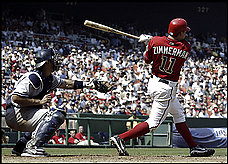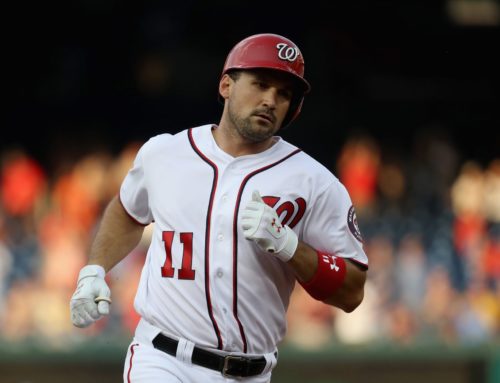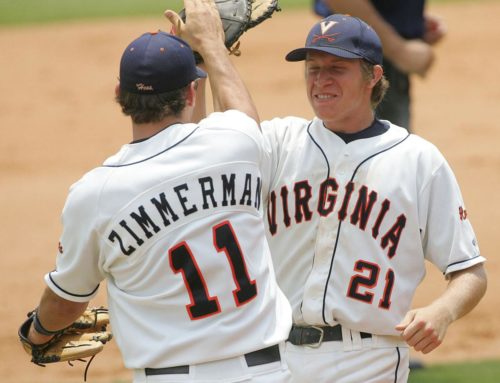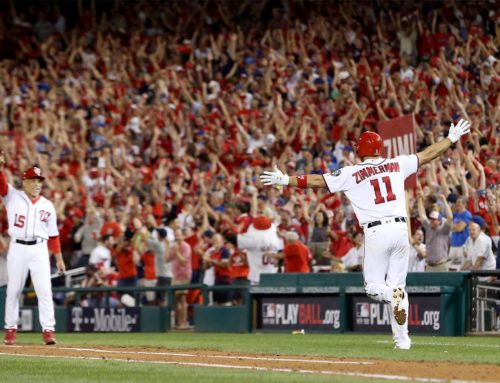By Barry Svrluga
Washington Post Staff Writer
Sunday, April 1, 2007
Two springs ago, when the Washington Nationals were preparing to return baseball to the nation’s capital for the first time in a generation, Ryan Zimmerman was a  20-year-old junior at the University of Virginia. He had signed some autographs — “maybe a few, for the Virginia baseball program and that kind of thing” — but he was an unknown.
20-year-old junior at the University of Virginia. He had signed some autographs — “maybe a few, for the Virginia baseball program and that kind of thing” — but he was an unknown.
On Monday, Zimmerman will be the Nationals’ starting third baseman as the club opens its third season here. He has attended parties with Scarlett Johansson and Tom Cruise, gets paid merely for signing a batting glove, will pen a column in a local paper and will, if he so desires, soon be able to pick up the phone and order a Ryan Zimmerman pizza.
His reaction to such an overhaul: “I could care less.”
With Opening Day at RFK Stadium coinciding with the start of Zimmerman’s second full season in the majors, the club has no greater selling point than the clean-cut line-drive hitter from Virginia Beach. The Nationals come into the season as the consensus pick to be the worst team in the majors, and therefore they are selling a future that they say will be much brighter, one with a new ballpark opening in 2008, a developing farm system and an energetic new manager in Manny Acta.
But at the center of the transformation is Zimmerman, the de facto face of the franchise and, if baseball scouts and executives prove correct, a star in the making. So as much as 2007 will be about how the Nationals take steps to become contenders, it also will be about Zimmerman dealing with his position as not only the club’s best player, but its most recognizable character.
ad_icon
“I want him to be one of many faces for the franchise,” Nationals President Stan Kasten said. “I don’t want to put it all on his shoulders.”
They are, however, shoulders that produced the swings that drove in 110 runs as a rookie a year ago, shoulders upon which Acta has placed a significant role for leadership in the clubhouse, shrugging off the fact that he is all of 22. It is why the Nationals — who could, potentially, trade nearly anyone on their roster over the coming season except their third baseman — have placed Zimmerman prominently in their advertisements in the run-up to what could be a long season.
“He’s articulate,” Kasten said. “He’s athletically gifted. He’s bright. He’s telegenic. He’s a good person. Did I leave anything out?”
Well, perhaps one thing: Zimmerman is decidedly low-key. And thus, he is just beginning the balance that, during his days as a lightly recruited infielder at Kellam High School, was unimaginable.
“I don’t say I hope I can go out and have a year so that I can be on a billboard in D.C. or get some endorsement deal,” Zimmerman said. “But as far as the team using me, if that’s what the people in the city want, if that’s what gets them to come out and watch us play, that’s great.”
Zimmerman spoke last week, sitting in a corner booth at a chain restaurant less than a mile from the Nationals’ spring training facility in Viera, Fla. Not a single person recognized him. But over sweet tea and steak fajitas, he acknowledged his life is changing. He has signed a variety of endorsement deals that, conservatively, could bring him $200,000 this season, half his on-field salary of $400,000. But he keeps coming back to one topic: “I just like to play the game.”
Thus, it is the responsibility of those around him not only to gauge what a burgeoning young star is comfortable with, but to position him in a marketplace that hasn’t had a true major league star since Frank Howard slugged homers for the old Washington Senators in the 1960s — long before athletes were marketed to the degree they are now.
“They have this amazing opportunity, because the Redskins are frustrating people,” said Bob Leffler, president of the Leffler Agency, a Baltimore-based sports marketing firm. “His opportunity is probably going to be as good as the profile of the team. But once you start playing, the games are a referendum on you. If he has this amazing year and they don’t, he might separate himself from the team.”
In part because of that, Zimmerman’s agents have begun the process of marketing their client in Washington. Before he was selected with the fourth overall pick in the 2005 draft, Zimmerman chose Casey Close and Brodie Van Wagenen of prominent sports agency International Management Group, or IMG, as his agents. The company, though, began a transformation after its founder, legendary sports marketer Mark McCormack, died in 2003. Eventually, Close, its primary baseball agent, and Tom Condon, the primary football agent, broke away and took their clients to Creative Artists Agency, an established firm that represents Hollywood’s glitterati.
Thus, Zimmerman was able to bring teammate Brian Schneider to CAA’s Super Bowl party, which he described as “ridiculous.” Johansson, Cruise, Katie Holmes, Billy Bob Thornton, Alec Baldwin, Nick Lachey, on and on. The event, for one night, represented the new world into which Zimmerman could move. But on a larger scale, his involvement with CAA — which also represents such megastars as Peyton Manning, LeBron James and Ryan Howard — could provide opportunities to dabble in areas that have nothing to do with baseball, should he so desire, a further indication that the worlds of sports and entertainment are merging.
“The whole agency literally is behind each and every client, whether they’re athletes or actors,” Close said. “We have resources and relationships at the very highest levels in so many areas — motion pictures, TV, broadcasting, philanthropy, marketing, licensing. If he wants to do that kind of thing, we would be able to provide him with some very unique opportunities.”
In part because Zimmerman is still establishing himself and in part because of his personality, his deals are fairly modest — for now. He will appear weekly on “Washington Post Live,” a new show on the Comcast SportsNet cable network that features Post reporters. He will write a column for the Washington Examiner. He has a deal with an Infiniti dealership, signs balls and gloves and other equipment for Locker Room Memorabilia. Beginning in May, Papa John’s will produce the Zimmerman pizza.
“He’s not Derek Jeter,” Van Wagenen said. “He’s not Ryan Howard. We’re not trying to make him into something beyond what he is, what he’s comfortable with. But we want him to be positioned to do things that are important to him in his life as his star continues to rise.”
To that end, nearly all of Zimmerman’s endorsement deals provide a tie-in with his new charity, the ziMS Foundation. Zimmerman’s mother, Cheryl, has multiple sclerosis and is confined to a wheelchair. Last year, Zimmerman started the foundation with his own money. This weekend, the Web site — https://zimsfoundation.org– will go live. And now, each deal he negotiates will provide some money for Zimmerman himself, but a percentage will go to the foundation. For instance, for every Zimmerman pizza Papa John’s sells, the foundation will receive a cut, with the company guaranteeing a donation of $25,000. Expectations, though, are to generate perhaps $10,000 a month over the five months of the promotion.
“Given the situation I was in, it was kind of a no-brainer,” Zimmerman said. “I’m pretty lucky to have the ability to do this. It’s pretty cool that it’s a direct correlation to what I do for a living. I’m just lucky to be where I’m at and do what I do and be able to use what I do to make money for people that need it.”
There is, of course, the potential for an adjustment to how Zimmerman lives his life. Now, he said, “I like going out in D.C., just hanging out.” But he has seen his friend, New York Mets third baseman David Wright, get overextended by the demands of fame. When the pair walk into a restaurant in Manhattan, Zimmerman trails behind, watching the forks drop, the heads turn, the whispers begin.
“I’m kind of like, holy cow! This is unbelievable, ” Zimmerman said. “It’s kind of like I’m learning about it now. It’s different for me, but I’m getting more comfortable with the idea. I kind of like it.”
The steak fajitas were gone. An ordinary meal at an ordinary chain restaurant was over. A potentially extraordinary stage in Ryan Zimmerman’s life was just beginning.
“I guess you just got to have fun with it,” he said, “because there’s not too many people that get to do these things.” When you were growing up, you never thought that you’d be making money doing . . . commercials.”







Yeah, cool decision from Zimmerman, and of course a good player